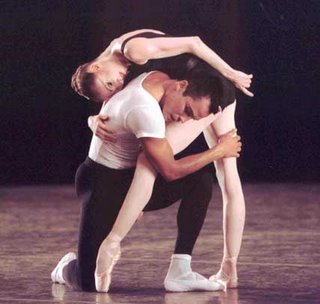Igor Stravinsky's Agon

In the early 1950's, Igor Stravinsky was crossing the Mojave Desert in a car with his wife and personal assistant, but Stravinsky was stranded in a desert of his own. He had hit a creative wall; his neo-classical leanings had warn themselves out. He was being taunted by audiences, not for being too avant-garde, but rather for being too tame and predictable. He was in the composer's wasteland, and there seemed like there was no way out of it.
His assistant, however, suggested something that was right in front of his musical face: the current musical fad of the time, serialism. Stravinsky had been a contemporary of Schoenberg and Webern but had yet to even touch a twelve-tone row nor did he even know how to write one. He had kept a cool distance from atonality. Nevertheless, he went after this music for his creative life, but he did it not in a cold or impersonal style like Boulez or Stockhausen, but as, well..... Stravinsky.
Agon is Stravinky's last ballet, and in Greek means "game" or "challenge". It is a classical competition between the new and old styles of music, with lots of "Greek-sounding" stuff sprinkled in between. As in all struggles, both styles compete, feed off each other, and grow as the piece progresses. But all throughout, there is no mistaking who composed it. The typical Stravinsky energy of L' Oiseau de Feu, Le Sacre du Printemps, and Pulcinella is there. Like all these pieces, too, it has a very unique inspiration, but the end is still the same: a manifestation of Stravinsky's genius.
What this piece teaches to us non-musicians is not to be afraid of modernity, but that if we embrace things in the right manner, we can assimilate them, change them, and learn to love them. While we can still be traditional in many ways, we have to find a way to struggle with the world that will lead in the end to growth on both sides. This is a very Christian attitude, if not the most Christian.



2 Comments:
I found this blog surfing. It was a good find.
I hope you can find Stravinsky's collaboration with Benny Goodman, a piece called "Ebony Concerto".
I like your conclusion to your post, as well as your artistic taste.
I'm linking to this blog, to remind me to visit more often.
Post a Comment
<< Home